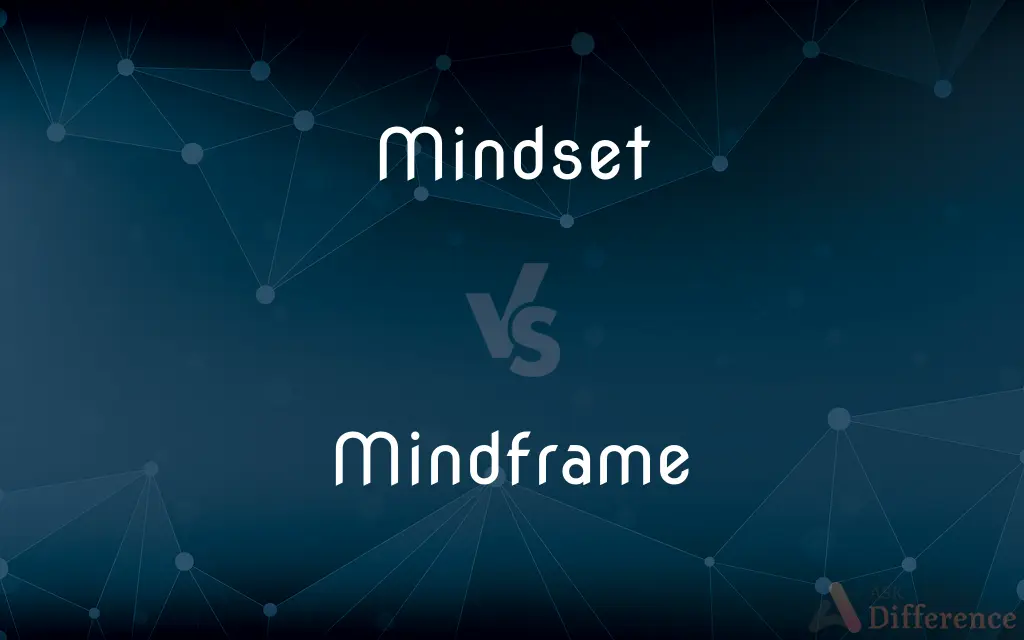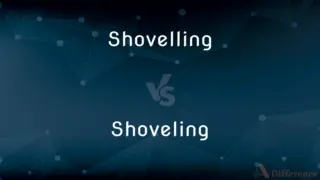Mindset vs. Mindframe — What's the Difference?
By Tayyaba Rehman & Maham Liaqat — Updated on March 22, 2024
Mindset is person's way of thinking and their attitudes towards life, shaping their responses and behaviors. Mindframe, used interchangeably with mindset, specifically emphasizes temporary or situational frame of mind influenced by current circumstances.

Difference Between Mindset and Mindframe
Table of Contents
ADVERTISEMENT
Key Differences
A mindset encompasses the collection of beliefs, attitudes, and predispositions that an individual holds, deeply influencing how they interpret and interact with the world. It's a stable and enduring aspect of one's personality, affecting decisions, behaviors, and ultimately, life outcomes. Conversely, mindframe, although often used synonymously with mindset, can imply a more temporary state of mind or perspective that is influenced by specific situations or contexts. For example, someone's mindframe might shift from optimistic to pessimistic based on immediate challenges or successes, reflecting a more fluid and situation-dependent state of mind.
The concept of mindset is pivotal in educational and professional settings, where it influences learning strategies, resilience in the face of challenges, and openness to feedback. A positive mindset can lead to greater motivation and achievement, as it frames challenges as opportunities for growth rather than insurmountable obstacles. On the other hand, a mindframe might be particularly relevant in negotiations, therapy, or creative endeavors, where an individual's current perspective or emotional state plays a crucial role in the process and outcome. A therapist, for instance, might work to understand a client's current mindframe to better address their immediate concerns or emotions.
Mindsets are often considered more fixed or ingrained, formed by a combination of personal experiences, cultural influences, and inherent dispositions. They can, however, be gradually changed or adjusted through conscious effort, reflection, and often, with external guidance or intervention. Mindframes, being more transient, can shift more readily based on new information, mood changes, or shifts in one's environment, offering a level of psychological flexibility that can be advantageous in rapidly changing or uncertain situations.
In the realm of personal development and psychology, understanding the distinction between a long-term mindset and a more fleeting mindframe can be crucial. For example, cultivating a long-term resilience mindset can provide foundational strength and perseverance, while being able to adapt one's mindframe in the face of immediate stressors or opportunities can offer tactical advantages in navigating life's challenges.
Comparison Chart
Definition
A person's established set of attitudes or beliefs.
A temporary or situational state of mind.
ADVERTISEMENT
Stability
Generally stable and enduring.
More fluid and changeable.
Influenced By
Personal experiences, education, culture.
Immediate circumstances, current emotions, specific events.
Impact
Shapes long-term behaviors and life outcomes.
Influences immediate perceptions and reactions.
Example
Believing that intelligence can be developed (growth mindset).
Feeling optimistic or pessimistic based on the day's events.
Changeability
Can be changed over time with effort and reflection.
Can change quickly with new information or situations.
Role in Personal Development
Integral to shaping overall approach to life and challenges.
Important for adapting to and navigating specific situations.
Compare with Definitions
Mindset
An individual's overall attitude and approach to life.
Her positive mindset made her resilient to setbacks.
Mindframe
A person's mental state or mood at a given time.
In a creative mindframe, she brainstormed innovative solutions.
Mindset
Reflects a person's worldview and core beliefs.
His environmentally conscious mindset influenced all his consumer choices.
Mindframe
Influenced by current circumstances or information.
News of the economic downturn put him in a pessimistic mindframe.
Mindset
Can be oriented towards growth or fixed in nature.
A fixed mindset led her to avoid challenges, fearing failure.
Mindframe
Affects immediate perceptions and interactions.
Her compassionate mindframe made her particularly empathetic during the crisis.
Mindset
Influences how one perceives and reacts to challenges.
His entrepreneurial mindset drove him to see opportunities in every problem.
Mindframe
Can shift with changes in environment or mood.
A walk in nature shifted his mindframe from stressed to tranquil.
Mindset
A set of beliefs that guide behavior and decision-making.
With a growth mindset, he viewed criticism as a chance to improve.
Mindframe
Often situation-specific and temporary.
In a competitive mindframe, he strategized meticulously for the game.
Mindset
In decision theory and general systems theory, a mindset is a set of assumptions, methods, or notions held by one or more people or groups of people. A mindset can also be seen as arising out of a person's world view or philosophy of life.A mindset may be so firmly established that it creates a powerful incentive within these people or groups to continue to adopt or accept prior behaviors, choices, or tools.
Mindframe
A mental attitude; a mindset; a frame of mind.
Mindset
A fixed mental attitude or disposition that predetermines a person's responses to and interpretations of situations.
Mindset
An inclination or a habit.
Mindset
A way of thinking; an attitude or opinion, especially a habitual one.
Earth Day is a way of propagating and celebrating the environmentalist mindset.
Mindset
A habitual or characteristic mental attitude that determines how you will interpret and respond to situations
Common Curiosities
Is mindset permanent?
While mindsets are relatively stable, they are not permanent and can be changed with conscious effort and sometimes with external support.
Can someone's mindframe affect their mindset?
Yes, repeated experiences or prolonged states of a particular mindframe can influence and potentially alter an individual's overall mindset.
Is it beneficial to have a flexible mindframe?
Flexibility in one's mindframe allows for adaptability and resilience in the face of changing circumstances, which can be beneficial in many aspects of life.
How quickly can a mindframe change?
A mindframe can change quite rapidly, influenced by immediate situations, emotional responses, or new information.
How do mindsets and mindframes interact in decision-making?
An individual's long-term mindset can guide overall decision-making principles, while their current mindframe might influence specific choices or reactions in a given moment.
Can focusing on mindframe improve mental health?
Being aware of and intentionally influencing one's mindframe, especially in challenging situations, can contribute to better mental health and well-being.
How can I change my mindset?
Changing a mindset involves self-reflection, seeking new experiences, education, and sometimes guidance from mentors or therapists.
Why is understanding someone's mindframe important?
Understanding someone's current mindframe can improve communication and empathy, making it easier to connect with and support them.
Does a positive mindset guarantee success?
While a positive mindset can increase resilience and motivation, success is influenced by many factors, including effort, opportunities, and external circumstances.
Can cultural background influence mindset?
Yes, cultural values, norms, and experiences can significantly shape an individual's mindset.
Share Your Discovery

Previous Comparison
Keel vs. Skeg
Next Comparison
Shovelling vs. ShovelingAuthor Spotlight
Written by
Tayyaba RehmanTayyaba Rehman is a distinguished writer, currently serving as a primary contributor to askdifference.com. As a researcher in semantics and etymology, Tayyaba's passion for the complexity of languages and their distinctions has found a perfect home on the platform. Tayyaba delves into the intricacies of language, distinguishing between commonly confused words and phrases, thereby providing clarity for readers worldwide.
Co-written by
Maham Liaqat













































